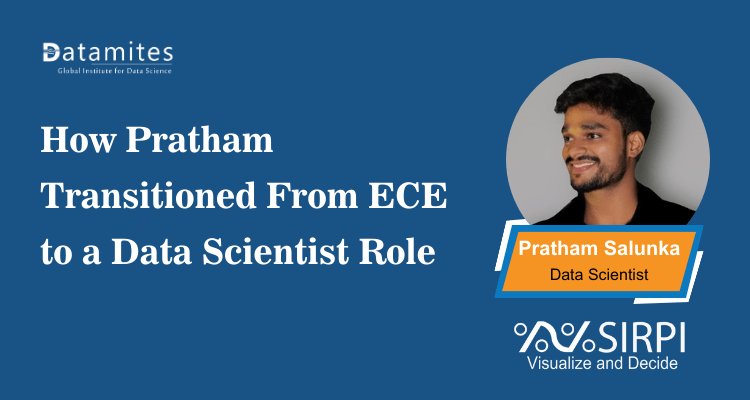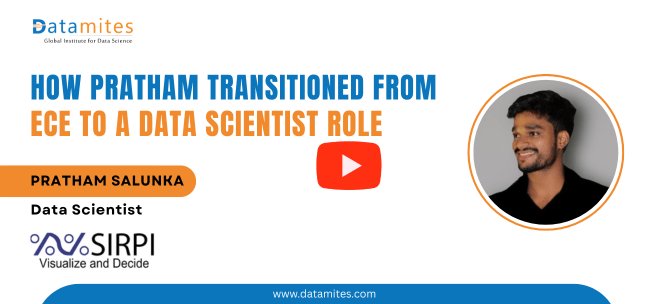How Pratham Transitioned From ECE to a Data Science Role
Pratham successfully transitioned from an Electronics and Communication Engineering (ECE) background to a data scientist role by upskilling through focused learning and practical experience. His journey highlights the power of determination, strategic learning, and the right mentorship in breaking into the data science field.

In today's digital era, transitioning from a traditional engineering background to an in-demand career like data science is becoming increasingly common. Yet, few stories are as inspiring and informative as that of Pratham Salunke, a 2024 electronics and communication graduate from Belgaum, North Karnataka, who successfully pivoted into data science through hard work, dedication, and smart learning strategies.
In this inspiring success story, we explore Pratham’s journey into the world of data science—from his reasons for choosing the field, the essential skills he picked up along the way, to his top tips for cracking interviews. He also shares his candid feedback on the DataMites training program. Whether you're a fresher or planning a career switch, watch DataMites success story to gain valuable insights and practical advice for launching your own data science career.
From Learner to Data Scientist: Pratham’s Journey with DataMites
Discover how Pratham transformed his passion for data into a thriving career through expert guidance and hands-on training with DataMites.
Q1: Can you give a brief introduction about yourself?
I completed my graduation in Electronics and Communication Engineering in 2024. After my degree, I decided to pursue a career in data science and enrolled in the Certified Data Scientist program at DataMites. The program lasted about four months, followed by an internship phase where I worked on multiple projects. This hands-on experience, along with consistent preparation, helped me clear mock interviews and secure a placement with Sirpi.
Q2: What made you switch from Electronics to Data Science?
Even during my engineering, I was always interested in automation and AI. I realized that data science is the foundational step to understanding AI, so I decided to pursue data science first with the goal of eventually moving into AI in the future.
Q3: What do you think is the most important skill to focus on in data science?
The core of data science is machine learning and statistics. These two form the backbone. After that, Python, SQL, and libraries follow. But without strong fundamentals in machine learning and understanding data, you can’t go far.
Q4: Did you have any prior programming experience before joining the course?
Yes, I had some hands-on experience with Python and SQL during my undergraduate studies. That helped a bit. But even if someone doesn’t have prior experience, consistent practice makes up for it.
Q5: How important is SQL in the data science field?
Very important. SQL is often the first step in any data science project. You use it to extract, read, and manipulate data from databases. Without SQL, you can’t begin data analysis or model building effectively.
Q6: How many hours did you study each day to master these skills?
I don’t believe in studying by the hour. My advice to freshers is: focus when you’re actually ready to learn. A highly focused 2-hour session is more productive than a distracted 5-hour one. Quality over quantity always.
Q7: How many projects did you complete, and which did you showcase during placements?
I completed 4 internship projects and 1 capstone project during the course. On top of that, I did 5-6 personal projects, totaling around 10. During interviews, I showcased one internship project from DataMites and two of my own personal projects.
Q8: What type of interview questions can freshers expect in data science roles?
For freshers, companies mainly focus on basics and problem-solving ability. They assess whether you understand concepts like ML algorithms, Python logic, and can think analytically. They’re not expecting advanced solutions but want to see if you can apply your knowledge practically.
Q9: Do interviewers expect perfect coding or just the right approach?
It’s more about approach and problem-solving. Interviewers often ask scenario-based or pseudo-coding questions to see how you break down a problem. Correct syntax is secondary to the logic behind your solution.
Q10: How did you stay focused and avoid distractions during your learning phase?
I had a clear goal—to become a data scientist. That motivation helped me stay focused. When you’re genuinely interested in what you're learning and you have a set goal, focus comes naturally. Also, limit social distractions and build a good learning environment.
Q11: How did you clear the mock interviews at DataMites?
I didn’t pressure myself too much. I had already appeared for 2 external interviews, which gave me confidence. I dedicated February entirely to preparation and cleared the mock interview in March.
Q12: How did you prepare your resume to get shortlisted?
Initially, I had a basic resume. But after clearing the mock interview, the DataMites placement team provided a well-structured format. I tailored my resume with their help, and that improved my shortlisting chances significantly.
Q13: Was the assessment at DataMites difficult?
It was moderate—not too tough, not too easy. If you’re consistent with your classes, take notes, and review materials regularly, the assessments are manageable. Stick to one material and don’t overcomplicate things.
Q14: How was the overall training experience at DataMites?
It was really good. What I appreciated the most was their course curriculum. I compared it with other institutes and found DataMites’ syllabus more comprehensive and practical. It definitely met my expectations.
Q15: How was the support from the DataMites placement team?
The support was excellent. Honestly, I didn’t even get this level of help during my college placements. They were proactive in helping with resume building, shortlisting companies, and overall guidance.
Q16: What roadmap would you suggest for freshers preparing for data science interviews?
Here’s a quick roadmap:
- Start with Python – focus on basics, data structures, functions, etc.
- Learn SQL – be comfortable with joins, group by, and subqueries.
- Study Statistics and Probability – key for understanding ML.
- Dive into Machine Learning – learn algorithms, model building, and evaluation.
- Work on Projects – real-time or personal projects show practical skills.
- Build a Strong Resume – tailor it for the role you’re applying for.
- Practice Mock Interviews – simulate real interviews as much as possible.
“If you have a goal, focus will automatically come. Stay curious, stay consistent, and make sure you're genuinely interested in the field. Data science is not just a trend—it’s a long-term career if you approach it the right way.”
Refer these articles:
- From Aspiration to Achievement: Karthik’s Data Science Journey
- Adheeka's Journey: From Fresher to Successful Data Scientist
- Ameya Diwate’s Successful Data Science Career Journey
Key Takeaways from Pratham’s Journey into Data Science
From an Electronics and Communication graduate to a data scientist, Pratham's story is a powerful example of focused learning and smart career moves. Here are the highlights of his successful transition:
- Pratham Salunke is a 2024 ECE graduate from Belgaum who transitioned into data science.
- He chose data science to build a strong foundation for a future career in AI.
- He emphasized the importance of mastering Machine Learning and Statistics.
- Prior exposure to Python and SQL helped, but he stressed that consistent practice matters more.
- SQL plays a crucial role in extracting and preparing data for data science projects.
- Focused study sessions (not just long hours) are more effective for learning.
- He completed around 10 projects, including internship, capstone, and personal projects.
- In interviews, companies look for problem-solving skills and understanding of ML basics.
- Interviewers care more about logic and approach than perfect coding.
- He cleared mock interviews by preparing consistently and gaining confidence from real ones.
- With the support of the DataMites placement team, his resume saw a marked improvement.
- The assessments at DataMites were moderate and manageable with regular revision.
- He found DataMites’ course structure more practical than other institutes.
- Placement support at DataMites was proactive and better than his college experience.
- Suggested roadmap: Learn Python, SQL, Statistics, ML, do projects, build a tailored resume, practice interviews.
Refer these articles:
- How to Become a Data Scientist in Pune
- Data Science Course Fee in Pune
- Why Data Scientist Career in Pune
Pratham’s story shows how passion, focus, and the right guidance can help anyone—regardless of background—break into a data-driven career. His tips are especially useful for freshers and career switchers. With Data Science among the top IT courses in demand, it’s a smart path for future-ready careers. To get started, follow Pratham’s lead: master the basics, build real projects, stay focused, and keep learning.
If you're inspired by Pratham’s transition into the field of data science, now is the perfect time to upgrade your skills and enter this rapidly growing industry. According to Precedence Research, the global data science platform market is projected to grow from USD 150.73 billion in 2024 to over USD 676 billion by 2034, at a CAGR of 16.20%. As industries produce vast amounts of data, the need for skilled data professionals is steadily increasing. Choosing a reliable training provider that offers hands-on projects, practical exposure, and job support is key to starting a successful data science career. Enrolling in a top-rated data science training in Pune, Bangalore, Chennai, Hyderabad, Mumbai, or Delhi can open doors to exciting tech opportunities.
For Pratham, a 2024 ECE graduate from Belgaum with limited placement options locally, a structured training path and expert mentorship were game changers. Through in-depth training in Data Science, AI, Machine Learning, and Python — backed by globally recognized certifications from IABAC and NASSCOM FutureSkills — he built strong technical skills and confidence to enter the data science field.
DataMites Institute provides both online and offline data science training in Pune, Bangalore, Chennai, Hyderabad, Coimbatore, Ahmedabad, and Mumbai. This flexible learning model empowers freshers, working professionals, and career switchers alike — just as it did for Pratham.

